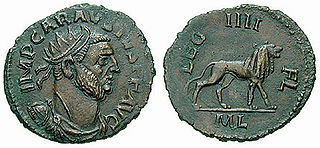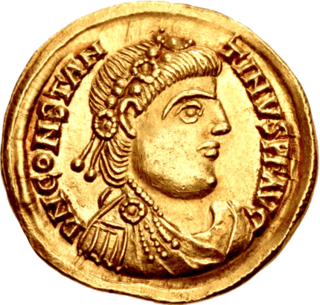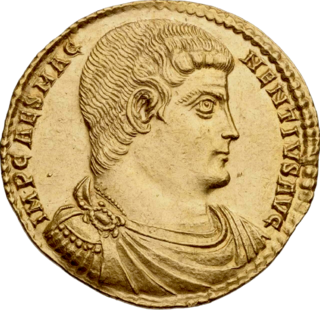Related Research Articles
Alypius of Antioch was a geographer and a vicarius of Roman Britain, probably in the late 350s AD. He replaced Flavius Martinus after that vicarius' suicide. His rule is recorded is Ammianus XXIII 1, 3.

Constantius II was Roman emperor from 337 to 361. His reign saw constant warfare on the borders against the Sasanian Empire and Germanic peoples, while internally the Roman Empire went through repeated civil wars, court intrigues, and usurpations. His religious policies inflamed domestic conflicts that would continue after his death.

Honorius was Roman emperor from 393 to 423. He was the younger son of emperor Theodosius I and his first wife Aelia Flaccilla. After the death of Theodosius in 395, Honorius, under the regency of Stilicho, ruled the western half of the empire while his brother Arcadius ruled the eastern half. His reign over the Western Roman Empire was notably precarious and chaotic. In 410, Rome was sacked for the first time in almost 800 years.

Julian was the Caesar of the West from 355 to 360 and Roman emperor from 361 to 363, as well as a notable philosopher and author in Greek. His rejection of Christianity, and his promotion of Neoplatonic Hellenism in its place, caused him to be remembered as Julian the Apostate in Christian tradition. He is sometimes referred to as Julian the Philosopher.
The 350s decade ran from January 1, 350, to December 31, 359.
Year 353 (CCCLIII) was a common year starting on Friday of the Julian calendar. At the time, it was known as the Year of the Consulship of Magnentius and Decentius. The denomination 353 for this year has been used since the early medieval period, when the Anno Domini calendar era became the prevalent method in Europe for naming years.

Flavius Valerius Constantius, also called Constantius I, was a Roman emperor from 305 to 306. He was one of the four original members of the Tetrarchy established by Diocletian, first serving as caesar from 293 to 305 and then ruling as augustus until his death. Constantius was also father of Constantine the Great, the first Christian emperor of Rome. The nickname "Chlorus" was first popularized by Byzantine-era historians and not used during the emperor's lifetime.

Constantius III was briefly Western Roman emperor in 421. He earned his position as Emperor due to his capability as a general under Honorius, achieving the rank of magister militum by 411. That same year, he suppressed the revolt of Constantine III, a Roman general who had declared himself emperor. Constantius then went on to lead campaigns against various barbarian groups in Hispania and Gaul, recovering much of both for the Western Roman Empire. Constantius married Honorius's sister Galla Placidia in 417, a sign of his ascendant status, and was proclaimed co-emperor by Honorius on 8 February 421. He reigned for seven months before dying on 2 September 421.

Marcus Aurelius Mausaeus Carausius was a military commander of the Roman Empire in the 3rd century. He was a Menapian from Belgic Gaul, who usurped power in 286, during the Carausian Revolt, declaring himself emperor in Britain and northern Gaul. He did this only 13 years after the Gallic Empire of the Batavian Postumus was ended in 273. He held power for seven years, fashioning the name "Emperor of the North" for himself, before being assassinated by his finance minister Allectus.

Allectus was a Roman-Britannic usurper-emperor in Britain and northern Gaul from 293 to 296.

Constantine III was a common Roman soldier who was declared emperor in Roman Britain in 407 and established himself in Gaul. He was recognised as co-emperor of the Roman Empire from 409 until 411.

Athaulf was king of the Visigoths from 411 to 415. During his reign, he transformed the Visigothic state from a tribal kingdom to a major political power of Late Antiquity.

Magnus Magnentius was Western Roman emperor from 350 to 353. Of Germanic descent, Magnentius served with distinction in Gaul under the emperor Constans. On 18 January 350 Magnentius was acclaimed Augustus. Quickly killing the unpopular Constans, Magnentius gained control over most of the Western Empire. The Eastern emperor Constantius II, the brother of Constans, refused to acknowledge Magnentius' legitimacy and led a successful campaign against Magnentius. Ultimately, Magnentius' forces were scattered after the Battle of Mons Seleucus, and he committed suicide on 10 August 353.

Paul I or Paulus I or Saint Paul the Confessor, was the sixth bishop of Constantinople, elected first in 337 AD. Paul became involved in the Arian controversy which drew in the Emperor of the West, Constans, and his counterpart in the East, his brother Constantius II. Paul was installed and deposed three times from the See of Constantinople between 337 and 351. He was murdered by strangulation during his third and final exile in Cappadocia. His feast day is on November 6.

Flavius Claudius Constantius Gallus (326–354) was a statesman and ruler in the eastern provinces of the Roman Empire from 351 to 354, as Caesar under emperor Constantius II, his cousin. A grandson of emperor Constantius Chlorus and empress Flavia Maximiana Theodora, and a son of Julius Constantius and Galla, he belonged to the Constantinian dynasty. Born during the reign of his uncle Constantine the Great, he was among the few male members of the imperial family to survive the purge that followed Constantine's death. Under Constantius II, Gallus served as deputy emperor, based in Antioch and married to Constantius' sister Constantina. He dealt with a Jewish revolt in the years 351-352. Gallus ultimately fell out of favor with Constantius and was executed, being replaced as Caesar by his younger half-brother Julian.
Julius Asclepiodotus was a Roman praetorian prefect who, according to the Historia Augusta, served under the emperors Aurelian, Probus and Diocletian, and was consul in 292. In 296, he assisted the western Caesar Constantius Chlorus in re-establishing Roman rule in Britain, following the illegal rules of Carausius and Allectus.

The fall of the Western Roman Empire, also called the fall of the Roman Empire or the fall of Rome, was the loss of central political control in the Western Roman Empire, a process in which the Empire failed to enforce its rule, and its vast territory was divided between several successor polities. The Roman Empire lost the strengths that had allowed it to exercise effective control over its Western provinces; modern historians posit factors including the effectiveness and numbers of the army, the health and numbers of the Roman population, the strength of the economy, the competence of the emperors, the internal struggles for power, the religious changes of the period, and the efficiency of the civil administration. Increasing pressure from invading barbarians outside Roman culture also contributed greatly to the collapse. Climatic changes and both endemic and epidemic disease drove many of these immediate factors. The reasons for the collapse are major subjects of the historiography of the ancient world and they inform much modern discourse on state failure.
Paulus Catena was a senior Roman public official who served as an investigator and notary for Constantius II during the mid-fourth century. He is principally known through the writings of Ammianus Marcellinus, though he is also present in the works of Libanius and Julian the Apostate. Marcellinus describes him as infamously cruel, and a skilled fabricator of false accusations.

The Carausian revolt (AD 286–296) was an episode in Roman history during which a Roman naval commander, Carausius, declared himself emperor over Britain and northern Gaul. His Gallic territories were retaken by the western Caesar Constantius Chlorus in 293, after which Carausius was assassinated by his subordinate Allectus. Britain was regained by Constantius and his subordinate Asclepiodotus in 296.
Andronicus was a poet of ancient Greece.
References
- ↑ Collins, R. (2016). Power at the periphery: military authority in transition in late Roman Britain. In Official Power and Local Elites in the Roman Provinces (pp. 147-164). Routledge.